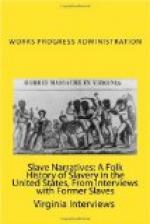The manner of worship was very much in keeping with present day modes. Preachers appealed to the emotions of the ‘flock’ and the congregation responded with “amens,” “halleluia,” clapping of hands, shouting and screaming. Willis remarked to one white man during his early life, that he wondered why the people yelled so loudly and the man replied that in fifty years hence the Negroes would be educated, know better and would not do that. He further replied that fifty years ago the white people screamed and shouted that way. Willis wonders now when he sees both white and colored people responding to preaching in much the same way as in his early life if education has made much difference in many cases.
Much superstition and ignorance existed among the Negroes during slavery and early reconstruction. Some wore bags of sulphur saying they would keep away disease. Some wore bags of salt and charcoal believing that evil spirits would be kept away from them. Others wore a silver coin in their shoes and some made holes in the coin, threaded a string through it, attached it to the ankle so that no one could conjure them. Some who thought an enemy might sprinkle “goofer dust” around their door steps swept very clean around the door step in the evening and allowed no one to come in afterwards.
The Negro men who spent much time around the “grannies” during slavery learned much about herbs and roots and how they were used to cure all manner of ills, the doctor gave practically the same kind of medicine for most ailments. The white doctors at that time had not been schooled to a great extent and carried medicine bags around to the sick room which contained pills and a very few other kinds of medicines which they had made from herbs and roots. Some of them are used to-day but Willis said most of their medicines were pills.
Ten years after the Civil War Willis Williams had advanced in his studies to the extent that he passed the government examination and became a railway mail clerk. He ran from Tallahassee to Palatka and River Junction on the Florida Central and Peninsular Railroad. There was no other railroad going into Tallahassee then.
The first Negro railway mail clerk according to Willis’ knowledge running from Tallahassee to Jacksonville, was Benjamin F. Cox. The first colored mail clerk in the Jacksonville Post Office was Camp Hughes. He was sent to prison for rifling the mail. Willis Myers succeeded Hughes and Willis Williams succeeded Myers. Willis received a telegram to come to Jacksonville to take Myers’ place and when he came expected to stay three or four days, but, after getting here was retained permanently and remained in the service until his retirement.
His first run from Tallahassee to Palatka and River Junction began in 1875 and lasted until 1879. In 1879 he was called to Jacksonville to succeed Myers and when he retired forty years later, had filled the position creditably, therefore was retired on a pension which he will receive until his death.




